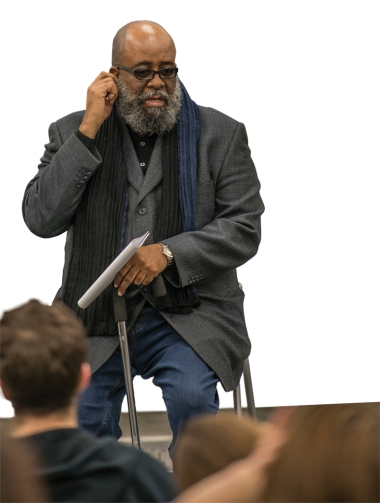The Lifetime Achievement Award recognizes outstanding and sustained accomplishment in community-engaged scholarship through research, creative activity, teaching, and/or service. Given the special nature of this distinction, it is not an annual award, but is conferred on those occasions in which the individual's extraordinary accomplishments are sustained over the span of a career.

"I've had enough experience with being pessimistic to know that is not the answer."
Carl S. Taylor
Carl S. Taylor
College of Social Science
Carl Taylor's extensive field research in Detroit and other hard-hit Michigan cities has earned him a national reputation as a leading expert on American youth culture, gangs, and violence. His multidisciplinary approach as an ethnographer, ecologist, and criminologist led him to become an advocate for investing in human capital, especially with regard to strengthening a community's relationship with its youth.
He spent thousands of his own dollars and six years living in an inner-Detroit neighborhood, following two violent street gangs. The result was a ground-breaking book, Dangerous Society (1989)1. One unexpected finding of this research was the extent to which the young gangsters had become sophisticated entrepreneurs with corporate-style organizations in the drug business. A later book, Girls, Gangs, Women and Drugs (1993)2, documented the rising numbers of young women who were getting involved with these activities. In 2013, "The Attraction of Gangs: How Can We Reduce It?" (co-authored with Pamela R. Smith) appeared in the joint National Institute of Justice/ Centers for Disease Control and Prevention publication, Changing Course: Preventing Gang Membership3.
Despite sometimes grim statistics, a central theme in Taylor's research, teaching, and advocacy is hope. He grew up in Detroit, witnessed the city's fall from prominence, and hopes to see it rise again, this time in a way that benefits all Detroiters.
Taylor is a University Outreach and Engagement University-Community Senior Fellow. He received the MSU College of Social Science Alumni Association Outstanding Teaching Award in 2015. He also received the Department of Sociology Excellence-in-Undergraduate Teaching Award in 2013, 2014, and 2017. Taylor has worked with such organizations as the Guggenheim Foundation, the C. S. Mott Foundation, the FBI Academy, and the Children's Defense Fund. He also served on the Michigan Juvenile Justice Committee for more than ten years and advises various projects concerning youth throughout America.
Sources
- Taylor, C. S. (1989). Dangerous Society. East Lansing: Michigan State University Press. Back to article
- Taylor, C. S. (1993). Girls, Gangs, Women and Drugs. East Lansing: Michigan State University Press. Back to article
- Taylor, C. S., & Smith, P. R. (2013). The attraction of gangs: How can we reduce it? In T. R. Simon, N. M. Ritter, & R. R. Mahendra (Eds.), Changing course: Preventing gang membership (pp. 19-29). Washington, DC: U.S. Department of Justice, Office of Justice Programs. Back to article